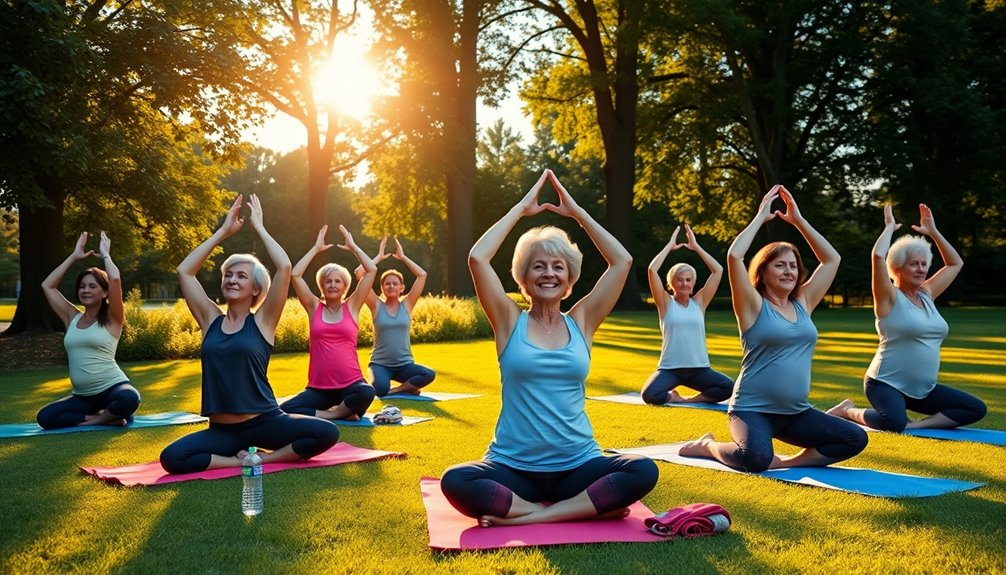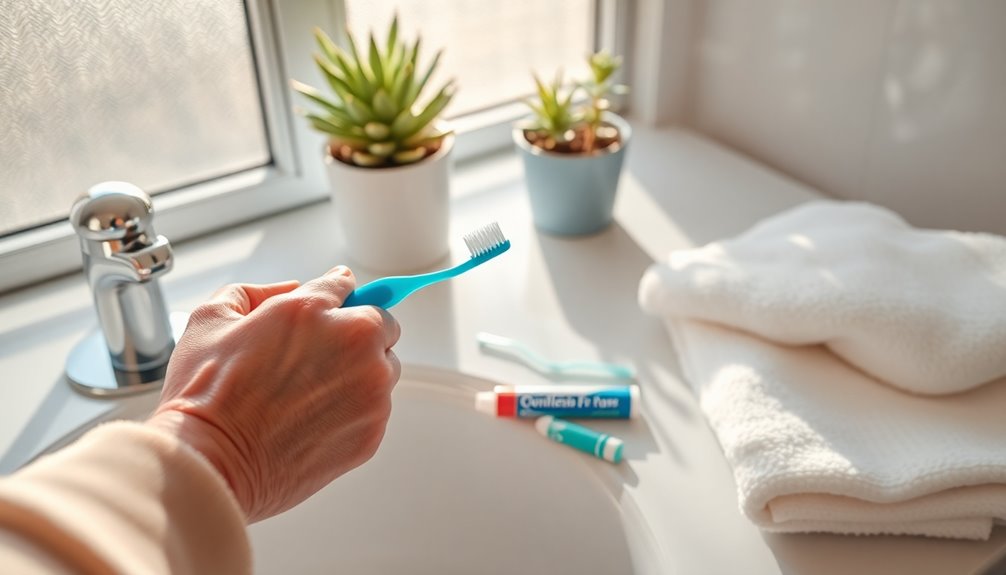As a senior, boosting your health starts with exercising regularly to enhance balance and mobility. Don't forget to maintain a healthy diet rich in fruits and lean proteins. Prioritizing sleep is vital, too—aim for 7-9 hours a night. Engage in preventive healthcare by scheduling regular exams and eye check-ups. Foster social connections and challenge your brain with new activities. Finally, manage sun exposure and limit alcohol intake. Keep exploring to discover more essential tips for your health journey!
Key Takeaways
- Engage in regular exercise, aiming for three to five times a week, to enhance mobility and reduce fall risk.
- Maintain a balanced diet rich in fruits, vegetables, and whole grains to support overall health and digestion.
- Prioritize sleep by aiming for 7-9 hours per night and creating a relaxing sleep environment.
- Schedule regular preventive health screenings and eye exams to catch potential health issues early.
- Foster social connections through community activities to combat loneliness and enhance mental well-being.
Exercise Regularly

While you might think that exercise is only for the young, staying active is essential for seniors too. By choosing to exercise regularly, you can enhance mobility, flexibility, and balance, which considerably reduces the risk of falls. Incorporating low-impact activities into your routine can also improve cardiovascular health and boost your overall well-being. Research shows that exercising three to five times a week can elevate your mood and energy levels. Additionally, maintaining positive energy can influence your motivation to stay active and committed to your exercise routine. Regular physical activity can also support overall health by reducing the risk of chronic diseases and improving longevity.
Consistency is key; moderate activity often yields better long-term benefits than high-intensity workouts. Before starting any exercise program, it's wise to consult with healthcare providers to make sure your routine is safe and tailored to your individual health conditions.
Maintain a Healthy Diet

Maintaining a healthy diet is crucial for seniors, as it directly impacts your overall well-being and energy levels.
Focus on a balanced diet that includes a variety of fruits, vegetables, and lean proteins. Incorporate whole grains and high-fiber foods to aid digestion, especially since saliva and stomach acid production may decline with age. Additionally, ensure you're getting enough essential fatty acids to support overall health.
Staying hydrated is imperative; aim for clear or light yellow urine to confirm you're drinking enough fluids.
The Mediterranean diet, rich in healthy fats and antioxidants, can help prevent chronic diseases like heart disease and diabetes. Additionally, including high-fiber foods in your meals can improve digestive health and support regularity.
Finally, consider eating small and frequent meals to improve nutrient absorption and digestion, allowing you to feel your best every day.
Prioritize Sleep

A balanced diet lays the foundation for good health, but prioritizing sleep is just as important for seniors.
You typically need 7-9 hours of sleep per night to support your overall health. Sleep difficulties may arise from medications, health issues, or lifestyle factors, so it's essential to identify and address any underlying causes.
Creating a sleep-conducive environment by keeping your bedroom cool, dark, and quiet can considerably improve sleep quality. Establishing a consistent sleep schedule helps regulate your body's internal clock, leading to better sleep patterns.
Engage in relaxing activities before bed, like reading or listening to calming music, to wind down effectively. By prioritizing sleep, you can enhance your well-being and tackle daily challenges with renewed energy. Additionally, maintaining a positive mindset can significantly influence your sleep quality and overall health.
Engage in Preventive Health Care

Engaging in preventive health care is essential for maintaining your well-being as a senior.
Regular screenings can help catch potential health issues early, leading to better treatment outcomes. Additionally, understanding required minimum distributions can help you plan financially for your healthcare needs in retirement. Make sure to take advantage of Medicare's preventive services to stay on top of your health needs. Additionally, consider establishing clear savings goals to ensure you can afford necessary healthcare expenses in retirement.
Importance of Regular Screenings
How often do you think about the importance of regular health screenings? These screenings—like cholesterol tests and diabetes screenings—are crucial for early detection of health issues, considerably enhancing your treatment options. Seniors should never overlook annual physical exams to maintain peak health. Additionally, integrating state-specific benefits into your retirement planning can also contribute to your overall well-being and financial security during your golden years.
Here's a quick overview of essential screenings:
| Screening Type | Recommended Starting Age |
|---|---|
| Cholesterol Tests | 45 |
| Diabetes Screenings | 45 |
| Colorectal Cancer | 45 |
Medicare offers free preventive services, making it easier for you to engage in preventive health care without financial strain. By prioritizing these screenings, you empower yourself to manage your health better and improve your overall quality of life. Additionally, regular screenings like mammography for early detection can significantly enhance treatment outcomes for conditions such as breast cancer.
Early Detection Benefits
While prioritizing early detection can feel overwhelming, it's essential for maintaining your health as a senior. Engaging in preventive health care through regular screenings allows you to catch issues like high blood pressure, diabetes, and cancers early, improving your treatment outcomes. Creating a safe and comfortable living space can also facilitate easier access to healthcare services.
Scheduling annual physical exams helps monitor health changes and enables timely interventions to prevent complications from chronic diseases. Additionally, regular follow-ups are recommended to detect late-onset complications from conditions like breast cancer. Don't forget vaccinations, which can greatly reduce your risk of serious illnesses like pneumonia and influenza.
Keeping a health diary to track symptoms and medications enhances communication with your healthcare provider, ensuring tailored care. By employing early detection strategies such as routine blood tests and health assessments, you can identify potential problems before they escalate, ultimately promoting a higher quality of life. Additionally, being aware of breast cancer risk factors can empower you to take proactive steps in your health management.
Medicare Preventive Services Available
Medicare offers a range of preventive services that make it easier for seniors to prioritize their health. You can take advantage of annual wellness visits, which help you create personalized prevention plans and address any health concerns.
Medicare covers essential screenings for chronic diseases like diabetes, heart disease, and high cholesterol, allowing for early detection and better management. Cancer screenings, including mammograms and colonoscopies, are also crucial for catching issues early.
Don't forget about vaccinations; Medicare provides coverage for the flu shot, pneumonia vaccine, and hepatitis B vaccine to keep you healthy. Additionally, regular eye exams are covered, helping detect conditions like glaucoma and macular degeneration, ensuring you maintain your vision health as you age.
Schedule Regular Eye Exams

Scheduling regular eye exams is vital for seniors, as these check-ups can reveal early signs of serious health issues like Alzheimer's disease and other forms of dementia.
By attending annual eye exams, you can catch eye diseases such as glaucoma and macular degeneration early, allowing for timely treatment.
Maintaining peak visual acuity is essential for your safety, as it helps prevent falls and guarantees safe driving.
It's recommended that you schedule these exams at least once a year, or more often if you have existing eye conditions or risk factors.
Prioritizing your eye health greatly contributes to your overall well-being and enhances your quality of life.
Additionally, understanding the importance of advance care planning can help you make informed decisions about your health as you age.
Don't overlook the importance of caring for your eyes!
Maintain Oral Health

Maintaining good oral health is essential for seniors, as it not only prevents dental issues but also plays a vital role in overall well-being.
Regular dental cleanings every six months can greatly reduce the risk of cavities and gum infections, which may lead to serious health concerns.
With reduced saliva production, you're more vulnerable to dental problems, making oral hygiene even more important.
Poor dental hygiene isn't just about your mouth; it's linked to heart disease and other systemic conditions.
Regular check-ups with your dentist can help address specific safety procedures during visits.
A healthy mouth also supports better nutrition, allowing you to enjoy a varied diet that boosts your overall health and energy levels.
Foster Social Connections

Building meaningful relationships is key to your overall health as you age.
By joining community activities or volunteering, you not only combat loneliness but also enrich your life and the lives of others. Engaging in community activities can provide a sense of purpose and belonging, which are vital for mental health. Additionally, fostering social connections can help you protect emotional health and enhance your overall well-being.
Let's explore how these connections can boost your mental and physical well-being.
Build Meaningful Relationships
While it's easy to feel disconnected as you age, fostering social connections is essential for your overall well-being. Building meaningful relationships can dramatically reduce feelings of loneliness and isolation, which can be as harmful as smoking 15 cigarettes a day.
Regular social interaction with friends and family enhances mental well-being and encourages health-enhancing behaviors, leading to a more active lifestyle. Engaging in community activities allows you to share experiences and gain emotional support, creating bonds that enrich your life.
Innovative solutions like chat benches in public spaces can help spark conversations and connections. Remember, by prioritizing social connections, you're not just combating loneliness; you're investing in your health and happiness.
Join Community Activities
Participating in community activities offers a fantastic way to strengthen the social connections you've already started to build. Joining community activities can greatly reduce feelings of loneliness, which can be as harmful to your health as smoking 15 cigarettes a day. Group activities foster meaningful connections, enhancing your overall happiness and emotional health. They also improve mobility and health behaviors, contributing to a better quality of life.
| Benefits of Community Activities | Examples of Activities |
|---|---|
| Reduce feelings of loneliness | Joining a local club |
| Enhance overall happiness | Attending social events |
| Foster meaningful connections | Participating in group exercises |
| Provide a sense of purpose | Volunteering in the community |
Engaging in these activities can truly enrich your life!
Volunteer and Give Back
Volunteering not only allows you to give back to your community, but it also helps you form valuable social connections that can greatly enhance your mental and emotional well-being.
Engaging in volunteer activities can considerably reduce loneliness and isolation, improving your overall health.
Here are four key benefits of volunteering:
- Boosts Mental Well-Being: Regular social engagement enhances happiness and life satisfaction.
- Improves Physical Health: Volunteers often experience lower rates of depression and better overall health.
- Enhances Cognitive Function: Staying active through volunteer work can sharpen your mind.
- Creates a Sense of Purpose: Contributing to your community fosters fulfillment and community connections.
Challenge the Brain

As you age, challenging your brain becomes vital for maintaining cognitive health and enhancing memory retention. Engaging in activities like puzzles, crossword games, and reading can greatly boost your cognitive function.
Consider learning new skills, such as playing a musical instrument or a new language, to stimulate brain pathways and promote mental flexibility. Research shows that fully immersing yourself in these activities leads to greater brain engagement and cognitive improvement.
Regular cognitive challenges not only help reduce the risk of dementia but also combat age-related cognitive declines. Incorporating social elements, like group games and classes, not only challenges the brain but also fosters social connections, which are essential for your emotional well-being.
Manage Sun Exposure

Managing your sun exposure is essential for maintaining healthy skin as you age.
Aim to soak up the sun during off-peak hours and always use broad-spectrum sunscreen with at least SPF 30.
Safe Sun Exposure Practices
While enjoying the sun can boost your mood and provide essential vitamin D, it's important to practice safe sun exposure habits to protect your skin.
Here are four key tips:
- Timing: Aim for sun exposure during off-peak hours, before 10 a.m. and after 4 p.m., to minimize harmful UV radiation.
- Sunscreen: Use broad-spectrum sunscreen with at least SPF 30, applying generously and reapplying every two hours, especially after swimming or sweating.
- Clothing: Wear protective clothing like wide-brimmed hats and UV-blocking sunglasses to shield your skin and eyes from sun damage.
- Skin Monitoring: Regularly monitor your skin for any changes or unusual spots, as early detection is essential for preventing serious health concerns.
Stay safe while enjoying the sun!
Skin Protection Strategies
To safeguard your skin from the harmful effects of sun exposure, it's essential to adopt effective protection strategies. Excessive sun exposure can lead to skin damage and increase your risk of skin cancer.
Always use broad-spectrum sunscreen with at least SPF 30, reapplying every two hours, especially after swimming or sweating. Incorporate protective clothing, like long-sleeved shirts and wide-brimmed hats, to shield yourself from harmful UV rays.
Aim to be outside during off-peak hours, specifically before 10 a.m. and after 4 p.m., to reduce UV intensity. Regularly monitor your skin for unusual changes, such as new moles, to guarantee early detection of potential issues.
Consult your healthcare provider if you notice anything concerning.
Limit Alcohol Intake

Limiting alcohol intake is essential for maintaining your health as you age. While moderate alcohol consumption—defined as up to one drink per day—can offer some health benefits, it's vital to be mindful of potential risks.
Here are four key points to reflect on:
- Know Your Limits: Aim for moderate alcohol consumption to avoid excessive drinking.
- Health Issues: Be aware that alcohol can lead to liver disease and increase fall risks.
- Cognitive Effects: Excessive drinking may contribute to cognitive decline, especially in seniors.
- Consult Healthcare Providers: Always seek personalized advice from your healthcare providers regarding alcohol consumption based on your health status and medications.
Stay informed and make choices that support your well-being!
Frequently Asked Questions
What Is the Number One Health Tip for Aging Well?
The number one health tip for aging well is to engage in regular physical activity.
When you incorporate even moderate exercise into your routine, you can reduce your risk of chronic diseases and boost your mental health.
Aim for strength training at least twice a week to maintain muscle mass and bone density.
What Should Every Senior Citizen Know?
Every senior citizen should stay savvy about their health. Start with regular check-ups, as they can catch complications early.
Stay active with gentle exercises like walking or swimming, which promote physical and mental energy.
Savor a sumptuous, balanced diet filled with fruits, veggies, and lean proteins to fend off chronic conditions.
Finally, strengthen social circles; connections combat loneliness and enhance happiness, making every day more delightful and dynamic!
What Is the Most Important Health Habit for Older Adults?
The most important health habit for older adults is regular physical activity. It enhances your mobility, reduces the risk of falls, and boosts your mental well-being.
Engaging in low-impact exercises like walking or swimming can improve your cardiovascular health and strengthen your muscles. Aim for at least 150 minutes of moderate-intensity aerobic activity each week; every bit of movement counts and can greatly improve your overall quality of life.
What Is One of the Most Important Things Older Adults Can Do for Their Health?
One of the most important things you can do for your health is to stay physically active. Regular exercise, like walking or swimming, keeps your body strong and helps prevent falls.
It also boosts your heart health and enhances your mobility. Pair this with a balanced diet full of fruits, vegetables, and lean proteins, and you'll set the foundation for better health.
Conclusion
By embracing these 10 essential health tips, you're not just adding years to your life; you're adding life to your years. Imagine waking up each day with energy, clarity, and a sense of connection. What if you could reveal the secret to aging gracefully? It's all within your reach. So, take the first step today—your future self will thank you. Will you accept the challenge and transform your golden years into something truly extraordinary?









